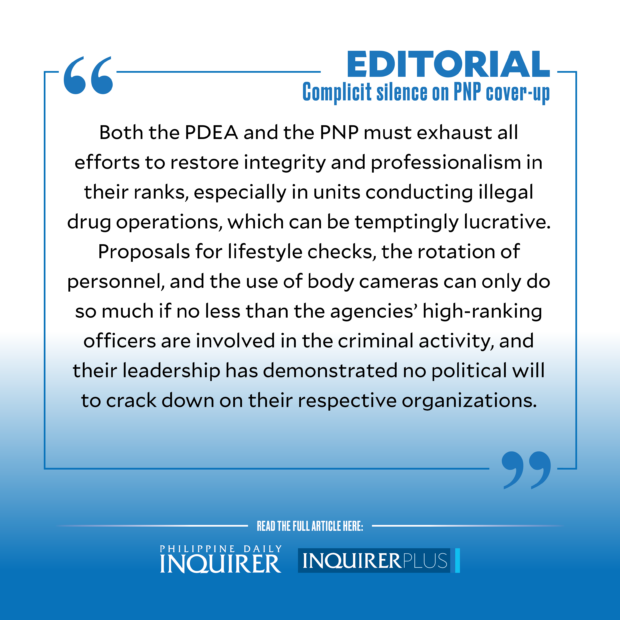Complicit silence on PNP cover-up
 It took Philippine National Police chief Rodolfo Azurin Jr. a full week to break his deafening silence on the involvement of the PNP’s Drug Enforcement Group (DEG) in an alleged cover-up and pilferage of seized illegal drugs worth billions.
It took Philippine National Police chief Rodolfo Azurin Jr. a full week to break his deafening silence on the involvement of the PNP’s Drug Enforcement Group (DEG) in an alleged cover-up and pilferage of seized illegal drugs worth billions.
Azurin’s choice to keep a low profile on this anomaly could be tied to his scheduled retirement next Monday. And while he finally spoke about the controversy yesterday, his blanket denial only raised more questions on how deep the involvement of police officers is in the irregularities exposed by no less by Interior Secretary Benhur Abalos.
Abalos, ex-officio chair of the National Police Commission that supervises the PNP, disclosed what he had described as a “massive attempt to cover up” the arrest of dismissed Police Master Sergeant Rodolfo Mayo Jr. in connection with the drug raid last year, which supposedly netted the biggest drug haul in PNP history.
Article continues after this advertisementIn a press conference last week, Abalos showed CCTV footage of the anti-drug operation by the DEG in Manila on Oct. 8, 2022, where 990 kilograms of crystal meth or “shabu” worth P6.7 billion were confiscated from Mayo. Mayo, then intelligence officer of the DEG Special Operations Unit-NCR, owns the Wealth and Personal Development Lending Inc. office where the illegal drugs were seized.
According to Abalos, the footage showed that instead of immediately taking the handcuffed Mayo away following his arrest, police officers entered a nearby building with him, transferring bags and luggage to several vehicles. Even more puzzling, Abalos said, was that based on records, the PNP already had Mayo in its custody even before the operation, contrary to the DEG report that he was arrested in a hot pursuit operation the day after the raid in his building. Worse, Mayo was even listed as an arresting officer in a different operation on the day of that raid.
Abalos recounted how the Department of the Interior and Local Government discussed the case with the PNP in February, and that he authorized another inquiry after noting the slow pace of the PNP investigation. The PNP later reported that some DEG officers were found to have stolen at least 42 kg from the drug haul, which were subsequently found in an abandoned car near Camp Crame. Following Abalos’ exposé, the PNP released its investigation report finding 49 members of the DEG liable for criminal and administrative charges amid irregularities in the illegal drug seizure.
Article continues after this advertisementThe list included DEG director, Police Brig. Gen. Narciso Domingo, who was replaced by Azurin after Abalos’ disclosure. Not included however were Police Lt. Gen. Benjamin Santos Jr., then deputy chief for operations and third-highest official in the PNP, and Lt. Col. Harry Lorenzo, station commander of the Manila Police District in Moriones, Tondo, despite their being identified in the footage presented by Abalos.
But why trust the PNP to conduct a probe into its own criminal activities? As seen in the CCTV footage, it tampered with the evidence and covered up the involvement of its own intelligence officer and, as listed in its report, 49 more DEG officers and men. A thorough investigation by independent parties must be pursued to identify and charge all those involved in this shameful incident, and to determine the extent of corruption in the PNP.
This latest scandal also begs the question: Which agency can be trusted to conduct the government’s operations against illegal drugs? Certainly not the PNP DEG, and not even the Philippine Drug Enforcement Agency (PDEA). Recall that in December last year, the head of the PDEA Southern District Office, Enrique Lucero, and two of his agents, were arrested in a drug buy-bust operation, and were found to be peddling illegal drugs right in their office. Agents of both PNP and PDEA also engaged in a shootout in 2021 over another drug buy-bust raid, which resulted in the death of two police officers, one PDEA agent, and an informant.
A PDEA officer himself told a recent Senate hearing about the common practice of giving 30 percent of the seized illegal drugs to tipsters instead of money. To that, the PDEA and the PNP have only offered weak denials instead of a categorical policy disallowing the disgusting deal.
Both the PDEA and the PNP must exhaust all efforts to restore integrity and professionalism in their ranks, especially in units conducting illegal drug operations, which can be temptingly lucrative. Proposals for lifestyle checks, the rotation of personnel, and the use of body cameras can only do so much if no less than the agencies’ high-ranking officers are involved in the criminal activity, and their leadership has demonstrated no political will to crack down on their respective organizations.
At the very least, Azurin, who had promised to reform the PNP, must be the first to accept responsibility and accountability for the wrongdoings of those under his command, instead of waiting for his retirement in what could be interpreted as complicit silence.
















